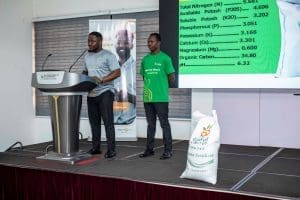Fidelity Bank Ghana has committed more than GH¢2 million across two cohorts of its GreenTech Innovation Challenge, positioning the initiative as one of the country’s most substantial private sector investments in agricultural technology and youth entrepreneurship.
The programme, launched in partnership with InnoHub Foundation, targets a critical gap in Ghana’s agricultural value chain. While the sector is valued at approximately $15.2 billion and projected to grow at 7.01% annually, smallholder farmers continue to face persistent challenges including climate volatility, post-harvest losses, and limited access to modern farming methods.
For the inaugural cohort, Fidelity Bank invested GH¢1.4 million in 17 young entrepreneurs whose innovations ranged from climate insurance to organic waste processing. The results exceeded expectations. Those businesses collectively generated over GH¢13 million in revenue, created 49 new jobs, and attracted an additional GH¢597,000 in external funding, suggesting the bank’s investment catalyzed far broader economic activity.
Among the standout success stories is Derrick Awumey’s AgricCom Assurance, which provides smallholder farmers with insurance protection against climate shocks like droughts and floods. The programme helped Awumey refine his business model and connect with key industry players, turning what was essentially a concept into a viable commercial operation serving vulnerable farming communities.
Emmanuel Acquah of AgriMercab demonstrated how solving one problem can address multiple challenges simultaneously. His operation converts organic waste into animal feed and fertilizer, and with GTIC support, he tripled his processing capacity from two tons to six tons monthly. The grant enabled him to install solar panels, creating a more sustainable and mechanized process that tackles both waste management and agricultural input supply.
Urban agriculture also received attention through Abdallah Salia’s Farmitecture, which provides farming systems for space-constrained city dwellers. The capital injection transformed his demonstration farm concept into a market-ready product, addressing the growing disconnect between urban populations and fresh food production.
Established businesses benefited too. Derrick Annan’s Axis Drone Surveys uses aerial technology to provide farmers with data for informed decision making, addressing what he identified as a critical barrier to modern farming. The programme didn’t just support his current operations but provided a strategic roadmap for expansion into markets like Tanzania.
Even businesses seemingly tangential to agriculture found value in the initiative. Violet Amoabeng’s Skin Gourmet produces handmade skincare from wild-sourced Ghanaian ingredients, highlighting the potential of agricultural value addition. The grant strengthened her supply chain and expanded her market reach, demonstrating how agricultural innovation extends beyond traditional farming.
Building on the first cohort’s success, Fidelity Bank is now focusing exclusively on early-stage businesses for Cohort 2. The bank is providing over GH¢1 million in grant funding to 16 selected enterprises, with the top three receiving GH¢200,000, GH¢100,000, and GH¢70,000 respectively. This strategic shift aims to nurture disruptive concepts at their most vulnerable stage, when traditional funding sources often remain inaccessible.
The second cohort maintains focus on critical areas including precision agriculture, post-harvest management, digital financial services, climate-smart practices, and value chain optimization. These themes reflect both immediate challenges facing Ghanaian farmers and longer-term structural issues that technology and innovation might address.
The timing couldn’t be more relevant. Global agriculture is experiencing simultaneous growth and disruption. The sector’s value stands at $4.82 trillion with projected growth of 3.44% annually, driven by demand for food, biofuels, and sustainable commodities. However, climate change, input costs, and geopolitical tensions create unprecedented risks requiring innovative responses.
In Africa specifically, connected agriculture markets are expected to surge from $2.9 billion to $9.87 billion between 2025 and 2031, as digital platforms revolutionize how smallholder farmers access markets, finance, and advisory services. Ghana’s agricultural entrepreneurs are positioning themselves at this intersection of traditional farming and technological transformation.
What distinguishes Fidelity Bank’s approach is its willingness to invest in unproven concepts and early-stage businesses that conventional financial institutions typically consider too risky. The bank isn’t simply writing checks; it’s providing mentorship, industry connections, and strategic guidance that often prove as valuable as the funding itself.
The challenge’s structure also reflects a sophisticated understanding of entrepreneurship. First cohort participants received support across different business stages, from ideation to scale-up, allowing the bank to assess what worked best. The decision to focus the second cohort exclusively on early-stage businesses suggests lessons learned about where intervention creates the most impact.
For Ghana’s agricultural sector, the initiative represents something beyond corporate social responsibility. It’s an acknowledgment that the country’s farming future depends on young people viewing agriculture as a technology-driven opportunity rather than a traditional occupation. By celebrating and funding agricultural innovators, Fidelity Bank is working to reshape perceptions and attract talent to a sector that desperately needs fresh thinking.
The programme also addresses a fundamental challenge in African entrepreneurship: the valley of death between concept and commercialization. Many brilliant ideas never reach the market simply because founders lack resources to test, refine, and scale their solutions. GTIC provides precisely that bridge, transforming potential into tangible businesses.
As applications closed for Cohort 2 in early July, interest reportedly exceeded available slots, suggesting strong demand among young Ghanaians for opportunities to innovate in agriculture. The question now is whether the programme’s success will inspire other financial institutions to make similar commitments, creating an ecosystem where agricultural innovation receives the sustained attention and investment it requires.
Source: newsghana.com.gh











